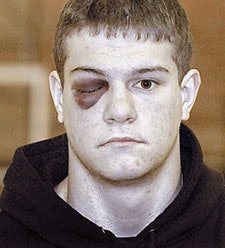Sports injury lawsuits, particularly at the prep level, frequently are dismissed after depositions.
 OPEN AND SHUT An injured student-athlete's inability to prove negligence often stems from case precedents or state and federal statutes.
OPEN AND SHUT An injured student-athlete's inability to prove negligence often stems from case precedents or state and federal statutes.High schools hit with a sports injury lawsuit enjoy inherent, institutional advantages that help keep such cases from being settled in favor of the plaintiff - or even from going to trial. An injured student-athlete often is unable to prove negligence on the part of a coach, administrator or school, either because case precedent has already been established in the defendant's favor or, perhaps most significantly, existing state and federal statutes protect schools and their employees.
For example, the Wisconsin Supreme Court last year upheld a lower court's ruling that Brittany Noffke, a high school cheerleader who was injured when she fell from the top of a formation during practice, could not sue the school district for her coach's alleged lack of supervision. Cheerleading is covered by the state's recreational immunity statute, which limits a school's liability for an injury sustained by someone engaging in an athletic or recreational activity on school property.
To cite another instance, in 2007, high school basketball player Tracey Yatsko, who sustained head injuries as the result of an on-court collision, lost her federal lawsuit against her coaches and the school district. She claimed they violated her constitutional right to be free from "harm to her bodily integrity and health," pursuant to Section 1983 of the Civil Rights Act. The only way the school and its coaches could have been held liable, the Federal District Court for the Eastern District of Pennsylvania ruled, would be if they had been acting under an official policy or custom.
John Hochfelder, a White Plains, N.Y.-based personal injury lawyer who has been practicing law for more than 30 years, is one plaintiff's attorney who would wholeheartedly agree with the courts' decisions in both of those cases. "Personal injury lawyers are often asked, 'Can I sue?'" he recently wrote in his law blog at www.newyorkinjurycasesblog.com. "I always answer, 'Yes, of course.' But the real question is whether the inquiring plaintiff will win, and in school sports injury lawsuits, the answer is almost always, 'No way.'"

250+ Exhibitors & 190 Educational Sessions | abshow.com.
Hochfelder also uses his blog (which he claims is read by potential clients and both plaintiff's and defense lawyers), to question why other attorneys take on sports injury cases involving minimal injuries and with little hope of proving fault on the defendants' part. "I'm not interested in taking sides," he says. "Although, frankly, if I had to take sides in these sports injury cases, more often than not I would be on the defense's side. Ridiculous lawsuits do nobody any good."
Sports injury lawsuits - especially at the high school level - frequently are dismissed after depositions, without a settlement and monetary gain for the injured student-athlete. By then, though, it's quite possible that the defense could already have spent thousands of dollars on hourly lawyer fees, while the plaintiff would have doled out plenty for depositions (which might cost between $200 and $500 each, Hochfelder estimates). Plus, both sides also may have hired investigators and doctors.
Hochfelder, a former youth baseball coach-turned-attorney and college baseball scout, learned his lesson several years ago while handling a case involving a high school soccer player who was punched in the face by an opponent and suffered a broken jaw. The case was settled during the deposition phase. "While it's pretty traumatic for a kid to have his jaw wired shut for six weeks, it's not the kind of thing that, even assuming a complete victory, makes it worth the cost of going to trial," Hochfelder says.
Which brings up another point: Many sports injury lawsuits also lack merit. The Superior Court of New Jersey, Appellate Division, in 2009 agreed with a lower court's decision to grant summary judgment to a school district that was sued by Tatiana Saracino, who suffered a nose injury during a floor hockey game in a high school physical education class. The court concurred that "there are insufficient facts in the record" to satisfy the state's threshold for recovering damages. That threshold includes "permanent loss of a bodily function, permanent disfigurement or dismemberment where the medical treatment expenses are in excess of $3,600."
As the courts like to say, injuries are part of the inherent risk associated with a given athletic activity. But when someone does get hurt, especially a minor, the blame game starts. Parents, frustrated with and angry at the circumstances, often seek comfort in the deep pockets of a school district's insurance company. "It really doesn't matter what the injury is," Hochfelder says. "We're in the era of no responsibility. So people think, 'Hey, my kid was injured, and somebody's at fault.' That's the philosophy that permeates society today. If I tripped and fell, I'd feel like an idiot. I wouldn't think of suing somebody."
But many other people do - despite the long odds of the case actually making it to trial or reaching a settlement. "Once those depositions are done, the defense is usually in a position to petition the judge for summary judgment, saying to the judge, 'Here's the summons of complaint, here are the transcripts of the depositions we've taken, and here is the law,'" Hochfelder says. "If the defense wins that motion, the case is now over unless the plaintiff feels he has grounds for an appeal. But if the defense loses the motion, that doesn't mean the school's case got weaker or the plaintiff's case got stronger; it just means that a single judge out there decided to let the case go to trial."
Once a case goes to trial and the wheels of justice start spinning, both defendant and plaintiff are at the mercy of judge and jury. Hochfelder suggests that administrators at a school in which a student-athlete has suffered a personal injury work fast to avoid a lawsuit in the first place. His advice? Be nice.
"It begins at the very beginning, and I'm not talking about preventing the injury, because that's part of practicing good safety," he says. "But when the injury happens, everybody at the school is nervous and afraid of a lawsuit. If the school and the coaches would express remorse about the injury and communicate with the family, I think you'd see fewer lawsuits. That's sometimes what people want. But everybody gets lawyered up so quickly and is afraid to say anything that walls get built immediately. I would bring down those walls a bit."




































